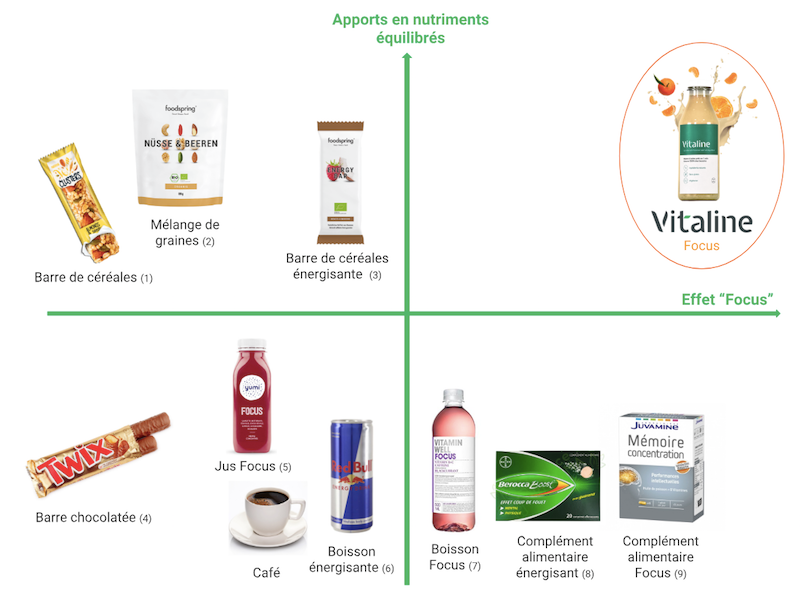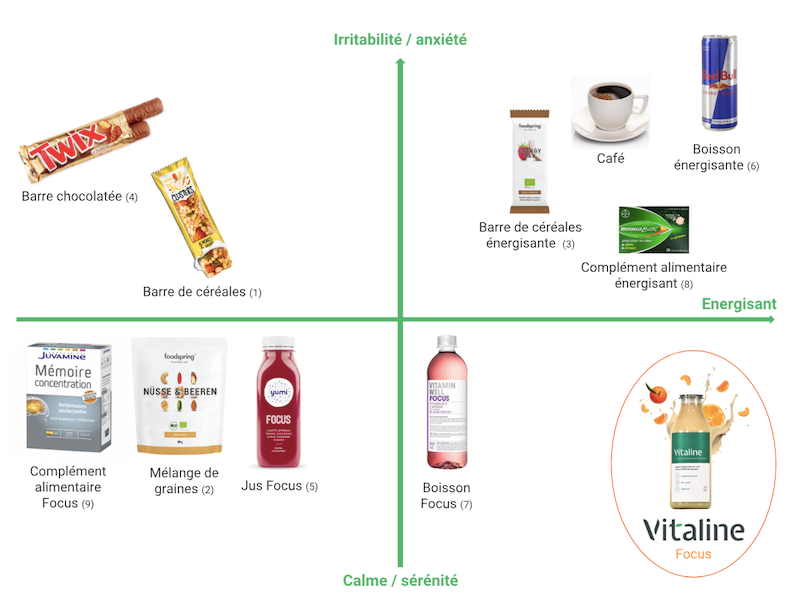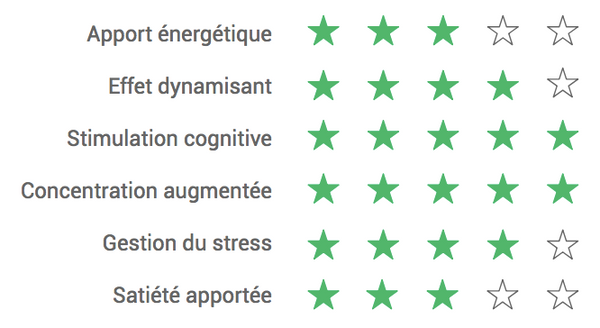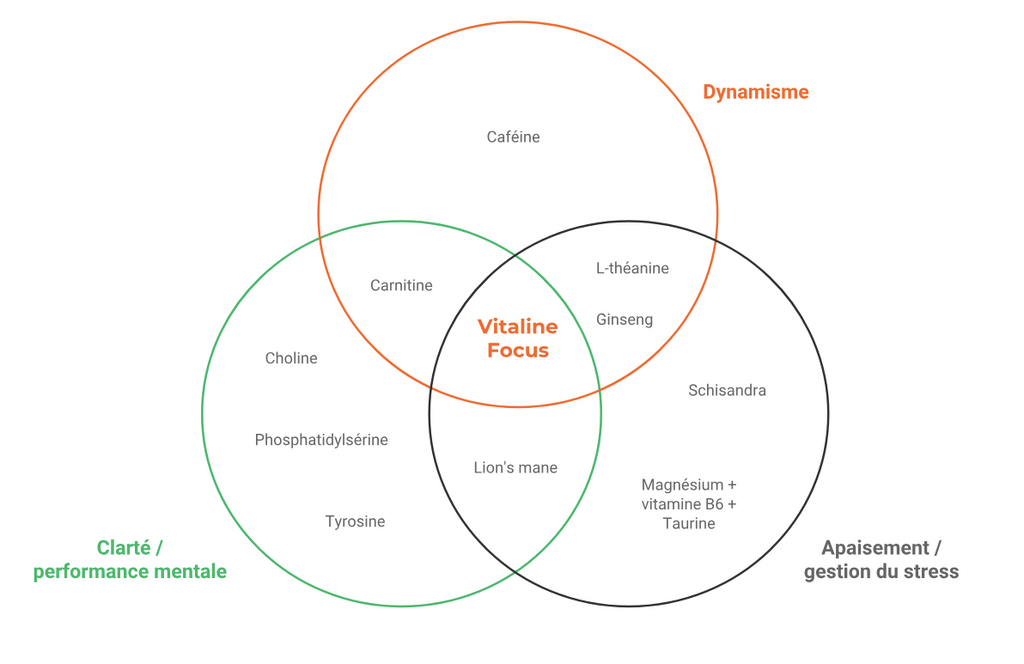It's summer, holidays... but at Vitaline we don't slow down the pace! We even anticipated the start of the school year by going out Vitaline Focus, our new version designed to help you perform in all your intellectual tasks.
We have developed Vitaline Focus to optimize nutrition in an intellectual work environment: finish a file, revise effectively, pass an exam, or simply end your working day with a good concentration.
Like the entire Vitaline range, this new version serves as a meal or snack, it is a food in its own right. It contains active ingredients for stimulate cognitive abilities, fight fatigue, lack of sleep, and help manage anxiety, one of the first factors of decreased productivity for intellectual work.
- Why did we launch a product to maximize intellectual performance?
- What are the effects of Vitaline Focus? When to consume it?
- The nutritional values of Vitaline Focus
- Active ingredients selected for their impact on cognition
- Pilot Program: be one of the first to test Focus!
Why did we launch a product to maximize intellectual performance?
We embarked on this new development because the proposed alternatives do not satisfy us: they are complicated and are not food (but food is a subject to be treated).
Today, we find that the proposed solutions do not allow to combine power supply and intellectual performance :
- Coffee has a boosting effect but it makes anxious1 and does not feed ;
- Snacks and juices provide energy, vitamins and minerals, but have a low impact on intellectual abilities and the felt energizing effect comes from the blood sugar spike, short-lived and followed by a period of counterproductive hypoglycemia ;
- Energy drinks Red Bull type have too high stimulating power that leads to harmful overexcitation to concentration. They contain a lot of sugar (27.5 g of sugar per can of Red Bull, or almost 5 pieces of sugar) without providing the other nutrients necessary for intellectual effort ;
- Dietary supplements energizers or formulated to promote concentration have an impact on intellectual abilities but do not provide any nutrients: their effect is therefore destroyed if we consume next to a sandwich or a pasta dish, which cause a postprandial crash.
It is noted in the mapping of the "focus" solutions below that there are no satisfactory complete solutions, hence the development of Vitaline Focus :

Coffee and other energizing products have stimulating properties, but they cause anxiety and irritability, which prevents concentration (see the mapping of energy solutions below). This is the reverse of Vitaline Focus, which helps to achieve a state of calm and serenity.

What are the effects of Vitaline Focus? When to consume it?
Vitaline Focus is a light drinking meal with a invigorating tangerine taste, which satisfies nutritional needs when one wishes to perform well on an intellectual task.
Vitaline Focus promotes cognitive stimulation, increases the concentration, fight against falling asleep and allows a better stress management.
Its consumption helps you to feel a effect of "flow state” : an optimal state of consciousness during which one feels at the best of one's abilities with superior mental clarity, and which therefore helps to be more efficient.

Vitaline Focus is to be consumed when you want starting an intellectually demanding task. Its effect is felt within half an hour after taking and extends over 2 to 4 hours.
Like our Daily range, Vitaline Focus contains 400 kcal. So she is just as nourishing and easy to digest, but lighter (more liquid and fresher taste) so that it can be consumed at the end of a meal or as a snack.
Vitaline Focus can be consumed at different times of the day, just before an intellectual effort :
- At breakfast or in the morning, to start your working day effectively ;
- At lunch at the end of the meal, to start the afternoon with a good concentration ;
- Around 16-17h, to fight against the hangover and finish his day without being hungry, remaining efficient and focused.
The nutritional values of Vitaline Focus
Like our entire range, Vitaline Focus is a healthy and nutritionally effective meal to drink. You will find the excellent nutritional qualities of Vitaline, in a product that has been adapted to meet the needs when tackling an intense intellectual task.
To improve concentration, we have designed Vitaline Focus with carbohydrates with short assimilation (30 min) to long (4h) in order to have a regular supply to the brain, which uses glucose as a preferential energy source.
We also avoid the hypoglycemia associated with postprandial crash thanks to the choice of carbohydrates with medium to low glycemic indices (oats, cassava, agave) as well as TCM (medium chain triglycerides). MCTs are a very high-availability source of energy for brain cells that support neural activity during periods of hypoglycemia, and thus improve cognitive abilities during intellectual exertion.2
It is also important to increase its consumption by omega 3proteins, which are essential polyunsaturated fatty acids that play a key role in the transmission of nerve messages in the brain. In particular, they can be consumed in the form of ALA (alpha-linolenic acid - this is the form present in Vitaline Focus) which is a precursor of two other types of omega 3 essential for proper brain function: EPA (Eicosapentaenoic acid) and DHA (Docosahexaenoic acid)3.
It would also have been beneficial to add omega 3 directly in the form of EPA or DHA, but they come from ingredients like fish, seafood or algae, and their taste is unpleasant and very difficult to mask.
Active ingredients selected for their impact on cognition
The active ingredients contained in Vitaline Focus are nootropics, whose role is to improve mental functions such as memory, attention and concentration.
Nootropics have a neuroprotective action and they are found naturally in our diet (vitamins, minerals, plants, amino acids ...). They intervene at different stages of the metabolism of brain function4.
They involve mechanisms such as increasing blood flow to the brain, supplying neurotransmitter precursors, improving neural functioning, or preventing oxidative damage caused by free radicals.
The diagram below summarizes the selection of ingredients made for Vitaline Focus and their effects :

| Active ingredient | Quantity and shape | Role and effects |
|---|---|---|
| Guarana berries | 2 g Contains 100 mg of caffeine5, the equivalent of one and a half espresso. |
Role: inhibitor ofadenosine, which is the molecule that prepares for falling asleep by inhibiting wakefulness systems. Effects: strong stimulating power, fights fatigue and increases alertness. |
| L-theanine | 200 mg6 That's the equivalent of 8 cups of black tea. |
Role: the activity of the L-theanine the effect on the brain is due to its structure similar to tryptophan, the precursor of serotonin. Serotonin plays an important role in regulating mood, emotionality, aggressiveness and sleep. Effects: reduction of mental and physical stress, relaxing effect, reduction of oxidative damage in the brain. Does not cause drowsiness or drowsiness, unlike the majority of plants with anti-stress properties (linden, chamomile etc.). Together, caffeine and L-theanine have a synergistic effect on cognition in a 1:2 caffeine/L-theanine ratio7. |
| Choline | 500 mg That is, the equivalent of the amount of choline present in 2 medium-sized eggs. Selected form: the choline bitartrate, a form of choline combined with a salt to facilitate its absorption. |
Role: CDP-Choline is a compound normally produced by the body : - Precursor of the phosphatidylcholine, one of the lipid components of the cell membrane that helps repair the membranes of damaged neurons. - Increases the production ofacetylcholine (neurotransmitter involved in memory and learning). - Increases the amount of receptors to the dopamine in the brain (neurotransmitter that allows increased attention). Effects: improves attention, memorization and learning4. |
| Carnitine | 500 mg8 That's the equivalent of 500 g of chopped steak. Chosen form: Acetyl-L-carnitine, which is the most effective form because its structure is close to that of acetylcholine. |
Role: theacetyl-L-carnitine Improves the production of acetylcholine and stimulates the synthesis of phospholipids contained in brain cell membranes. Effects: increases blood flow to the brain and improves cognitive performance4. |
| Tyrosine | 300 mg9 Or the equivalent of a big egg or 60 g of almonds. Selected form: N-acetyl-L-tyrosine, the most effective form for cognitive performance. |
Role: participates in the production of catecholamines (dopamine, NorepinephrineAnd Epinephrine), which are hormones overconsumed in the event of stress and intense concentration. Effects: increases mental energy levels, makes it possible to be alert and to achieve a feeling of well-being4. |
| Soybean Lecithin | 500 mg Contains 100 mg10 Of Phosphatidylserine, or the equivalent of 20 g mackerel or 100 g of white beans. |
Role: This is the Phospholipid (one of the components of cell membranes) most abundant in neurons. The synthesis of phosphatidylserine is complex and requires an effort that the organism may have difficulty providing in case of intense intellectual effort or aging, hence the interest of supplementation. Effects: promotes learning, concentration and mental recovery.4 |
| Hedgehog/Lion's mane (mushroom) | 500 mg11 (not present in Phase 1, will be in Phase 2) |
Role: Antioxidants contained in the hedgehog hydne (erinacines and heicenones) stimulate the growth of nerve cells and protect cells from oxidative stress. Effects: this fungus has beneficial effects on memorisation, more generally cognition12 And reduces anxiety13. |
| Berries of Schisandra | 1 g14 | Role: arborescent liane with adaptive properties. Protective action of tissues against oxidative damage by enhancing the antioxidant status of glutathione. Also involved in stimulation of the nervous system. Effects: stabilizes mood, prevents anxiety15 And could improve memorisation16. |
| Ginseng | 200 mg17 | Role: adaptogenic plant, which increases the body's ability to adapt to stress and regulates the amount of blood glucose. Effects: limit stress-related depressive conditions18 As well as perceived cognitive fatigue and improves mental performance19. |
| Magnesium | 74.3 mg That is 21.2 % of the VNR per bottle. Selected form: Magnesium Citrate, a very bioavailable form of magnesium (the quantity will be increased in phase 2). |
Role: Magnesium is an exhausted mineral in the event of stress. Supplementation avoids a disability and limits the adverse effects on the nervous and cardiovascular systems caused by the increased secretion of catecholamines and cortisol under stress.20 21 Effects: limits stress-related depressive conditions and may also improve cognitive performance.22 |
| Vitamin B6 | 429.2 µ g That is 25.2 % of VNR per bottle. Selected form: Pyridoxine hydrochloride, a very bioavailable form of vitamin B6. |
Role: Vitamin B6 is a cofactor in magnesium, it improves its uptake by the body. |
| Taurine (in addition to B6) | 50 mg The equivalent of 10 g of Alaskan salmon. That's 20 times less than in an energy drink. The taurine will be present in phase 2. |
Role: taurine is a soufried amino acid that improves the penetration of magnesium into cells. Effects: Thanks to their synergy with magnesium, B6 and taurine are involved in the regulation of stress and nervousness20. |
Pilot Program: be one of the first to test Focus!
Like all our new products, this new version is launched as part of our Pilot Program, which allows you to have access as soon as possible to our latest development.
With Focus, you will perform at the beginning of the year!
And also ... We launchedA discussion forum Which allows you to ask all your questions and exchange between you, especially about what's new in the Pilot Program. We look forward to seeing you there!
References:







